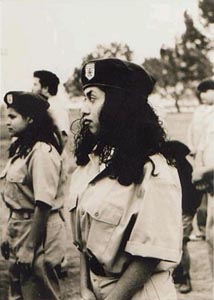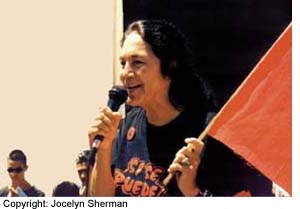Chicana Feminist Theory
&
Chicana Feminist Issues
Theory:
The oppression of the Chicana is intricate and arises from a multitude of domineering means. She is an ethnic minority, she is woman who is universally oppressed by men, and her Chicano heritage exaggerates this male domination over women. The first type of oppression mentioned is due to ethnicity of the Chicana. The Chicano culture is politically and economically exploited by Anglo society. Chicanos are considered subordinate, dependent and have been subjected to numerous accounts of genocide. Another type of oppression is due to gender. Women across the vast majority of cultures are considered subordinate and are universally oppressed by her male counterpart. In addition, there is also an internal oppression caused by the Chicana heritage. Some identify this as “machismo” and caused by the colonization of the Chicano. Whatever the origin, it has a depreciating effect on the Chicana and must be addressed. 6Machismo:
The Machismo is a term very multifaceted in it origins, definitions, and social and cultural implications.It is theorized that the repeated colonization of Mexico has taken the physical and spiritual power of its people away and has left the Chicano feeling weak. Because the Chicano has been unable to protect his people, (brothers, women, and children) from the violent conquest of his nation, he has developed a strong sense of masculinity as a compensation for his feelings of powerlessness 7. The same feeling of powerlessness continues to be instilled into the Chicano through his discrimination and oppression, and the washing away his dignity and creating an aggressive and protective nature of “his” woman and family 8.
Another derivation of Machismo may result from the necessity to have and express a Chicano cultural and national identity. Machismo in this frame does not relate to his manhood per se, but to pride in his Chicano Nation 9. It incorporates family values of responsibility as well as nurturing.
Social Scientists have created a stereotype of Machismo as a type of “masculinity syndrome” and have attributed it to the Latin male. The stereotypes are problematic because they create self-fulfilling prophecies in which both men and women start to become complacent to these assigned gender roles. 10
La Domesticana Chicana - Traditional Role of the Chicana:
Social Scientists also describe the Chicana. She is perceived to be a submissive, passive, woman under the command of the Chicano. Her roles are typically in the home and she is isolated from and ignorant to the world surrounding her.12 The Catholic Church is also another factor that perpetuates the roles of women as inferior and maintaining the family and sex roles currently in place. 14 Through the idea of "marianismo" the Chicana is often seen as the "Virgin Mary": she is saintly and motherly, a martyr, a virgin, a wife and sex object. 15Griselda Pollack, a Chicana artist, opens a new perspective of the roles of the Chicana based on ideology of femininity. She describes it as both a condition and an effect. If the position of femininity is moved by a change in representation so will the position of the Chicana. “The Chicana strategies of domesticana that emerge from the spaces of femininity, such as the bedroom, the kitchen, and the yard, retake the gaze, the centrality for its own meaning and begin to reposition the Chicana through the reworking of feminine space.” 13
Three Descriptions of Chicana Feminism:
The first description is "Chicana Liberal Feminism." This concentrates on the wants of the Chicana in order to improve the Chicano community while also focusing on "improving the status of women." The Chicana Liberal Feminist wants access to social institutions and employment. She develops awareness of the Chicana in the community and supports "political strategies" to help better the Chicana. Her focus is on improving both the Chicano Community and the role of the Chicana within it.
The second description is "Chicana Insurgent Feminism." This concentrates on "production and reproduction." The Chicana Insurgent Feminist wants revolutionary change within her community. Her struggles are against "racial discrimination, patriarchy, and class exploitation." She is more radical in her action and less compromising in her thinking.
The third description is "Chicana Cultural Nationalist Feminism." Women who belong under this description "identify as feminists but are committed to a cultural nationalist ideology." Although they feel there needs to be changes in gender roles they feel it is necessary to maintain tradition in the Chicano culture. 23Lesbianism in the Chicano Community:
Lesbianism is typically a taboo subject in the Chicano community. It rejects preconceived notions of Chicanas and their role within the family structure. It also rejects some of the belief of the major religion within the community. One cannot fully participate in religion and be a lesbian. Lesbianism disrupts the male dominance. It gives women power and control outside her typical role of wife, daughter, sister, and girlfriend. For heterosexual women in the Chicano community there is reluctance for some to associate with lesbians. The idea that they would be considered lesbian or that they are buying into the Anglo culture as Chicana Lesbians are reasons for this reluctance. 24
The New "Mestiza"
The mestiza consciousness is about allowing for contradictions . It is the "borderlands" of the Chicana. She exists monolingually and bilingually. She exists in an indigenous, Mexican, and American culture. It rejects the sections as race, class, and gender as separate identities and sees them intertwined, all connected to each other. It is about multiple identities and accepting these identities for oneself. It is being queer, being multiracial, being multicultural, being multilingual. It is about challenging what is the status quo and embracing ambiguity. 25
Issues:
Abortion, Reproduction and Health Care:
Chicanas want the right to control their body and make choices concerning them. Health care should be provided a staff that includes the Chicana and should be controlled by the Chicana community. There should be bilingual assistance so the Chicana is always aware of what it going on and able to get the help that she needs. Forced sterilization of poor Chicanas is also a big issue. In the past doctors have rationalized that it is okay to coerce women into sterilization, especially those whom are minority and poor. This is something the Chicana Feminists and all women should make sure does not happen.
Employment and Education:
Chicanas want education that is culturally relevant to them and is free of sexism. Chicanas have been historically and presently underrepresented in education. Chicanas want education for there children that is biligual and will not reject their culture. A few reasons for this is are the lack or support from the public education system and the lack of importance place on education for females in Chicano culture. Employment and education go hand in hand. Problems that exist with employment are communication barriers, lack of information concerning interview techniques and a lack of competitive entry level skills. Even when Chicanas do have the required skills they are not getting equal pay for equal work. They are making less than the Chicano and the Anglo male and less than the Anglo woman. 27Restructuring Political Familialism:
The role of the Chicana is typically of the mother and the caregiver . While the family structure is important to the Chicana, she also wants to be recognized as an intricate part of the family and the larger community. Utilizing the talents of the women and seeing them as equals is important. 28Child Care:
Child care was a very important issue to Chicana Feminists. They want free child care that was also bilingual and bicultural. They want to be able to seek employment without having to pay amounts for childcare that are equivalent to their rent. They also want the Chicano community to recognize that child was not the duty of the woman but the responsibility of the community. 29
Rape and Abuse:
Rape and abuse to women must always be taken seriously. Domestic abuse is not the right of the husband. Men must respect their women. It is important to the government that the Chicano community and the government take these issues seriously and take a firm stance again rape and violence. 30
Home | History | Issues and Theory | Interview with Martha Cotera | Bibliography | Credits
"As long as we see ourselves as inferior we are
collaborating in out own oppression."
-Grace Gil Olivarez 18
Stereotypes of the role of the Chicanas that must be "abolished."
“A woman is only good for making love to”
“All women should do is stay home, wash dishes, cook and clean the house”
“Women don't rap as good as men. They aren't as heavy regaurding the movement, and they don't command the respect of their peers”
“Women shouldn't be allowed to do community work, the work should be done by men.” 16


